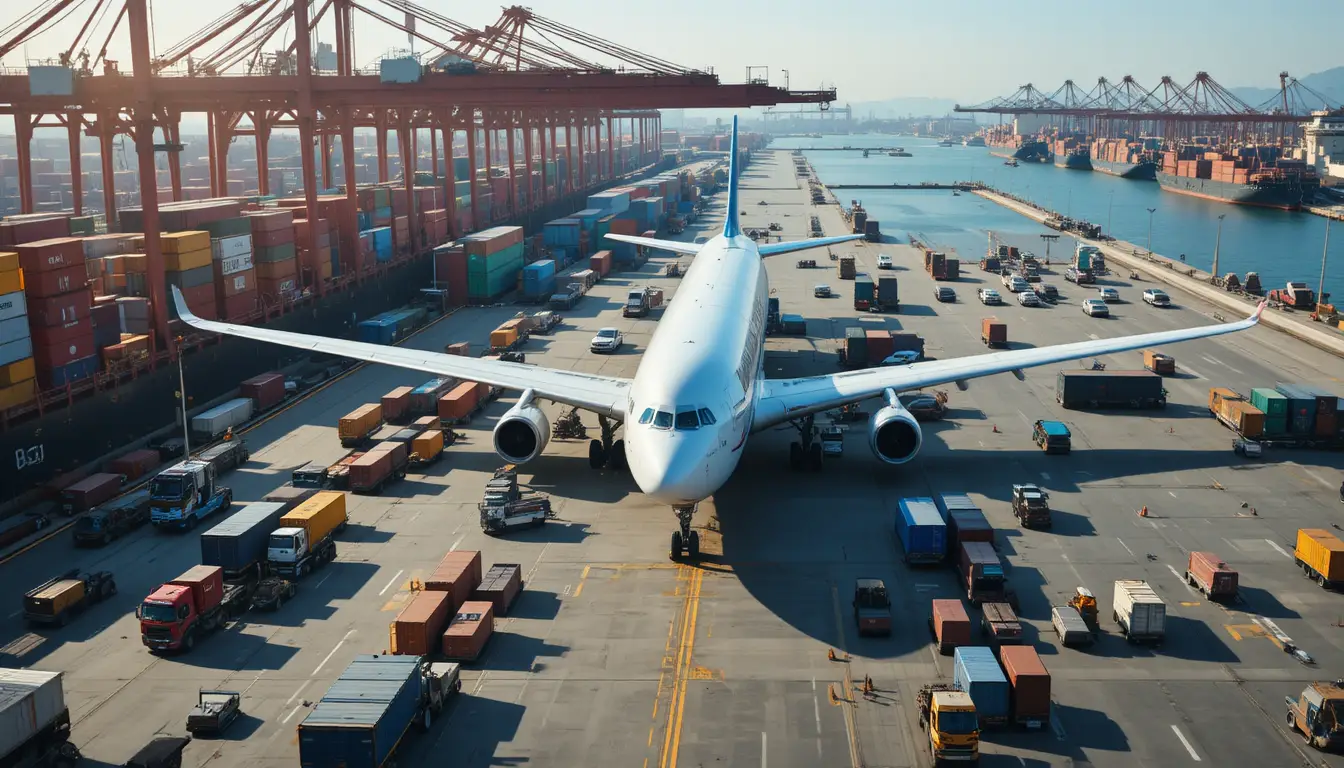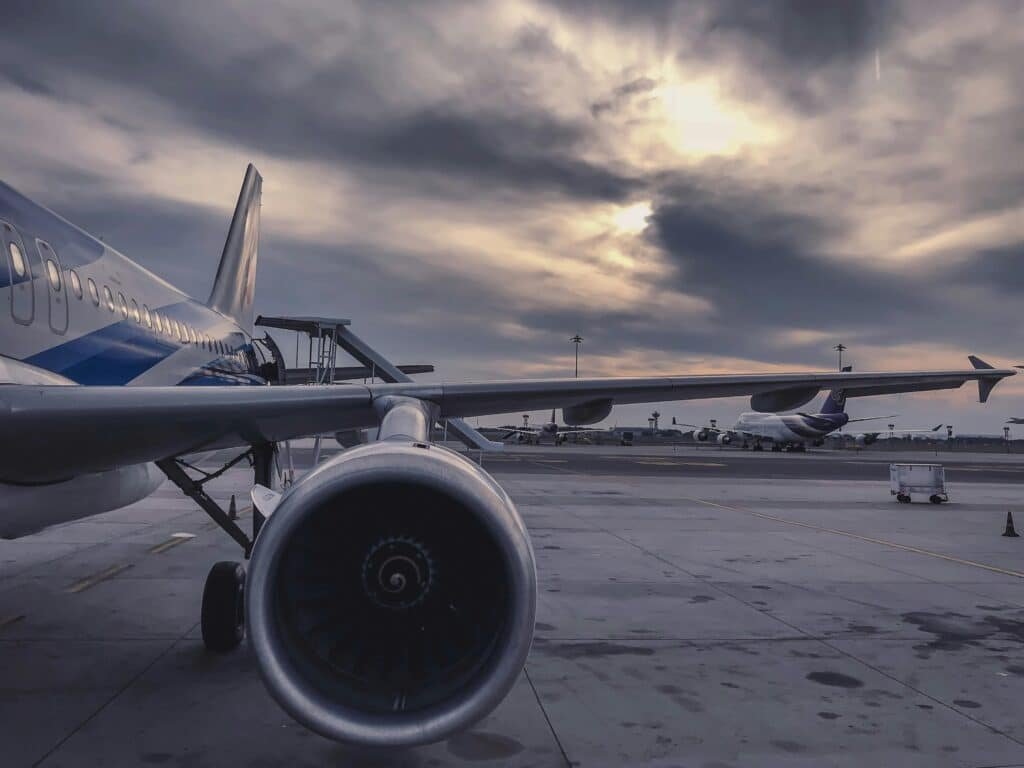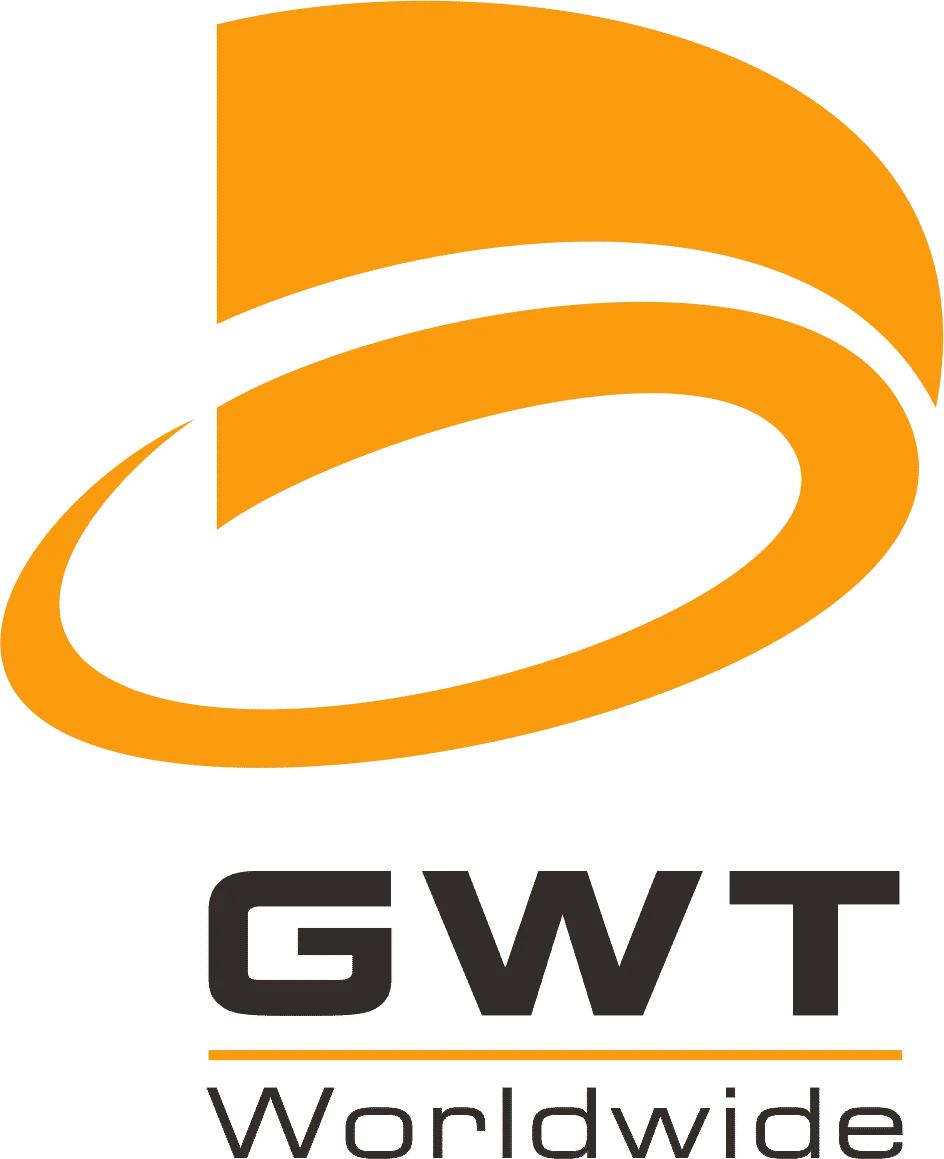Air Freight Forwarding Services in Singapore: The 2025 Guide for International Trade
By Guanwutong / October 27, 2025
Singapore handles millions of shipments every year, but for businesses importing from China, not all cargo is created equal. A single delay in air freight can ripple across supply chains, affecting product launches, inventory planning, and ultimately, revenue.
Choosing the right Air Freight Forwarding Services is no longer a background task—it’s a strategic decision. From navigating complex customs regulations to ensuring your goods arrive on time and in perfect condition, a skilled forwarder is the difference between smooth operations and a logistical headache. The requirement for a reliable international air freight forwarder specializing in the high-volume China-to-Singapore lane has never been greater.
A flight from China to Singapore might take only a few hours, but the coordination behind the scenes is far from simple. This guide cuts through the jargon, offering clear explanations of the air freight process, cost structures, compliance requirements, and real-world solutions that forwarders use every day.

Here’s what you’ll find inside:
Air vs. Sea: A comprehensive cost-benefit comparison.
The Complete Air Freight Process: Step-by-step guidance from pickup to delivery.
Cost Transparency: How charges are calculated and why air freight forwarder meaning hinges on clear pricing.
Customs & Compliance: The essential documents and permits for Singapore clearance.
Real-World Case Study: How complex challenges are handled in practice by a reliable international air freight forwarder.
1. Understanding the Role: What an Air Freight Forwarder Does and Why It Matters
Before utilizing their services, clients must understand the air freight forwarder meaning. An air freight forwarder is essentially the specialized architect of your international shipment, acting as your trusted intermediary and logistics planner.
What a Freight Forwarder Does
Think of an international air freight forwarder as the organizer of your international shipment, providing an end-to-end solution:
Booking Space: Securing contracted cargo space on reliable carriers, often at competitive rates unavailable to individual shippers.
Documentation: Preparing and verifying the Air Waybill (AWB), commercial invoice, packing list, and complex customs paperwork for both the origin (China) and destination (Singapore).
Consolidation: Combining smaller LCL (Less than Container Load) shipments into ULDs (Unit Load Devices) to save cost and optimize space, a crucial function in the overall air freight process.
Ground Logistics: Arranging pickup from the factory, managing warehousing, and overseeing the final delivery (last-mile logistics) in Singapore.
Expert Networks: Leveraging established carrier, terminal, warehouse, and customs contacts to reduce risk, negotiate delays, and ensure smooth operations.
A skilled forwarder like GWT Shipping can provide access to negotiated rates, specialized knowledge, and a global network that is almost impossible to replicate in-house, significantly simplifying the complex air freight forwarding process.
Air vs. Sea: When to Choose Air Freight
The choice between air and sea freight for the China-to-Singapore route is a core strategic decision based on cost, urgency, and the nature of the cargo.
| Feature | Air Freight | Sea Freight |
|---|---|---|
| Transit Time (China → Singapore) | 1–3 days (Port-to-Port) | 7–12 days (Port-to-Port) |
| Cost | Significantly Higher | Significantly Lower |
| Best For | High-value, low-volume, time-sensitive goods (e-commerce, electronics, pharmaceuticals) | Bulk, heavy, non-urgent cargo (raw materials, machinery, textiles) |
Tip: If a one-day delay would disrupt product launches, cause production line halts, or result in significant inventory holding costs, air freight is usually worth the premium. For Singaporean businesses relying on Just-In-Time (JIT) inventory models, the reliability and speed of air are invaluable.
2. Mastering the Air Freight Process: Step-by-Step Guidance
A reliable international air freight forwarder provides total transparency over every stage. Understanding the air freight process is key to managing expectations and deadlines.
Step 1: Quoting & Booking – Defining the Chargeable Weight
You Provide: Dimensions, actual weight, commodity details (HS Codes), and Incoterms (EXW, FOB, etc.).
Forwarder Action: We calculate the Chargeable Weight (the higher of actual or volumetric weight), provide an itemized quote, and book space on the airline.
Why It Matters: Bulky but light shipments consume valuable space; the chargeable weight calculation ensures fair pricing and is the foundation of the entire air freight forwarding process.
Step 2: Pickup & Documentation (China)
The forwarder coordinates pickup from the factory and verifies packaging against strict IATA (International Air Transport Association) standards, especially crucial for regulated goods.
Crucially, the forwarder proactively collects and reviews required documents: the commercial invoice, packing list, and any necessary origin permits (e.g., specific Chinese export licenses or battery certifications).
Step 3: Export Customs & Screening (China)
Shipment is delivered to the designated airport terminal (HGH, PVG, SZX, etc.).
The forwarder files the export declaration and ensures compliance with Chinese export controls.
Tip: Errors here, especially regarding valuation or forbidden items, can delay the entire shipment before it even leaves the ground.
Step 4: Main Carriage (Flight)
Cargo is loaded onto the selected flight and flown from China to Singapore.
Risk Mitigation: The forwarder provides real-time tracking, allowing them to anticipate and quickly handle contingencies such as flight delays, diversions, or off-loading due to weight or space issues.
Step 5: Import Customs Clearance (Singapore)
This is a point of specialization for Air Freight Forwarding Services in Singapore.
TradeNet System: The forwarder handles the import declaration via Singapore’s highly efficient online system, TradeNet, ensuring compliance with all local customs requirements.
GST: As of 2025, the Goods and Services Tax (GST) is 9%, calculated on the total CIF (Cost, Insurance, and Freight) value. The forwarder usually coordinates payment or arranges for the client’s Major Exporter Scheme (MES) status to be utilized.
Pro Tip: Accurate HS codes and valuations prevent holds, lengthy checks, or retroactive penalties from Singapore Customs.
Step 6: Delivery & Last-Mile Logistics
Cargo is retrieved from the Changi Airport (SIN) terminal and transported to the final destination in Singapore. This is the last mile of the air freight process.
Services may include cold storage transfer, specialized handling for fragile items, or standard trucking, depending on the goods. The forwarder ensures the chain of custody is unbroken until delivery.
For any questions, feel free to contact GWT Shipping. Our team will provide professional, standards-compliant advice tailored to your specific needs.
3. Decoding Air Freight Costs: Achieving Transparency
When engaging an international air freight forwarder, transparency in pricing is crucial to building trust.
Core Components of the Air Freight Bill
Chargeable Weight: The foundation of the price, calculated as the greater of actual or volumetric weight.
Base Rate: The agreed price per kilogram of chargeable weight.
Surcharges (Variable): These are dynamic and critical to watch: Fuel Surcharge (FSC) and Security Surcharge (SSC). These fluctuate based on global oil prices and security threat levels.
Handling Charges: Terminal handling fees (THC) at both origin and destination airports.
Customs Brokerage: The professional fee for managing the complex customs documentation and filing the declaration.
Duties & GST: Singapore GST is typically 9% of the total CIF value, which the forwarder often manages as part of the total bill.
Add-Ons: Insurance, specialized packaging (e.g., temperature control, reinforced pallets), and dangerous goods handling fees.
Currency & Payment Terms: Forwarders typically quote in USD or SGD. Established clients often have monthly credit terms, while new clients usually pay per shipment. Always clarify the payment terms to avoid disruptions in the air freight process.

4. Singapore-Specific Customs, Compliance & Risk
An expert air freight forwarder meaning is one who can keep you compliant and mitigate risk, especially for the high-value items shipped from China to Singapore.
Documentation and TradeNet Compliance
TradeNet: As Singapore’s national single window system, all import declarations must be filed electronically here. Your forwarder must have an active license and established procedures for this system.
HS Codes & Permits: Accurate classification (Harmonized System codes) ensures the correct assessment of GST and the identification of necessary permits. Minor classification errors can lead to customs holds and significant delays.
Agency Approvals: Critical for specialized cargo:
Health Sciences Authority (HSA): For pharmaceuticals, medical devices, and health supplements.
Singapore Food Agency (SFA): For all imported food and food-related products.
National Environment Agency (NEA): For controlled chemicals or environmental waste.
The Challenge of Regulated Cargo (Batteries and DG)
For the China-to-Singapore lane, electronics containing lithium-ion batteries are common. These are classified as Dangerous Goods (DG) and require:
IATA Compliance: Strict adherence to packaging, labeling, and documentation rules.
Segregation: Batteries must be correctly separated from other non-DG cargo.
A lack of experience in DG handling is the fastest way to get cargo rejected by the airline.
Risk Mitigation & Best Practices for Shippers
To ensure the smoothest air freight process, follow these best practices:
Data Accuracy: Always gather and confirm accurate dimensions, weight, and packing information early.
IATA Compliance: Confirm battery and hazardous goods compliance per IATA regulations before the goods leave the factory.
Documentation Integrity: Provide clean, consistent documentation: commercial invoice, packing list, and AWB.
Carrier Selection: Partner with reliable carriers and forwarders with proven performance on the China-to-Singapore lane.
Buffer Time: Always include a reasonable buffer time (12-24 hours) for customs clearance and unexpected terminal delays.
Real-World Case Study: Coordinating 18 Pallets of Smart Locks & Monitoring Equipment
This case study illustrates the practical expertise required to manage complex Air Freight Forwarding Services.
Background:
A Singapore client needed to ship 18 pallets of smart locks and monitoring equipment from Hangzhou (HGH) to Kuala Lumpur (KUL), a route often coordinated from Singapore. The cargo included lithium and dry batteries, which required separate palletization and specialized handling. The client’s initial plan involved costly domestic trucking to Shenzhen.
GWT Shipping’s Approach: Proactive Problem Solving
Route Optimization: Instead of following the costly original plan, GWT Shipping leveraged its international air freight forwarder network to secure a direct shipment from Hangzhou, saving the client both time and money.
Crisis Management: The biggest challenge occurred at the HGH terminal: the factory failed to segregate the batteries per IATA rules, and a severe staff shortage meant the airline was ready to reject the cargo.
Operational Commitment: The GWT Shipping team did not just call the client; they intervened physically. We coordinated with ground staff, securing the resources to manually break down and re-palletize all 18 pallets, ensuring strict separation of the battery types.
Compliance Execution: This hands-on intervention ensured the cargo met all IATA standards, allowing it to be accepted and loaded.
Outcome:
Despite a major last-minute operational hurdle, the shipment was dispatched on schedule. Recognizing this level of dedication and operational expertise, the client designated GWT Shipping as their preferred international air freight forwarder for all future shipments, including the critical China-to-Singapore route. This demonstrates the value of experience over mere pricing.
Conclusion
Air freight from China to Singapore may take only a few hours, but the coordination behind the scenes is complex. Every step, from securing space on reliable flights to ensuring flawless documentation, navigating customs, and coordinating delivery, demands precision and experience. A single misstep can cascade into delays, unexpected costs, or missed opportunities.
Choosing the right Air Freight Forwarding Services is a strategic decision that directly impacts your operational efficiency, product launches, and customer satisfaction. A skilled forwarder does more than move goods; they anticipate challenges, optimize routes, ensure compliance, and provide transparency over costs and timelines. With the right partner, your air freight operations become faster, smarter, and more reliable, enabling you to focus on your business while your supply chain runs smoothly.
With proven China-to-Singapore experience, GWT Shipping ensures your goods navigate the complex air freight process flawlessly. We are your reliable international air freight forwarder, ensuring your goods arrive on time, compliant, and safely.
FAQ
An air freight forwarder is a specialized logistics company that acts as an agent between the shipper and the airline. We organize the entire movement of goods, including booking, documentation, customs clearance, and delivery.
The main flight takes 1–3 days. The full air freight forwarding process, including door-to-door pickup, customs, and final delivery, usually takes 3–5 days.
Costs include the Chargeable Weight rate, base rate, surcharges (fuel/security), handling fees, customs brokerage, and the 9% Singapore GST.
The main advantage is access to their contracted networks, competitive rates, and specialized expertise in complex regulations (like IATA dangerous goods rules and Singapore Customs procedures), which mitigates risk for the shipper.
The core documents are the Commercial Invoice, Packing List, and the Air Waybill (AWB). Depending on the commodity, import permits from Singaporean agencies (HSA, SFA) may also be required.
Yes. As an international air freight forwarder, we specialize in express or time-critical solutions, using premium flights and dedicated handling to ensure the fastest possible transit time.
Look for proven experience on the China-Singapore lane, full transparency in pricing, proactive communication, and a track record of handling specialized cargo like batteries and electronics.
The biggest risk is improper documentation or non-compliance with IATA/Customs rules (especially regarding batteries or valuation), which causes cargo to be rejected or delayed by the airline or Singapore Customs.
Ready to streamline your China–Singapore air freight?

